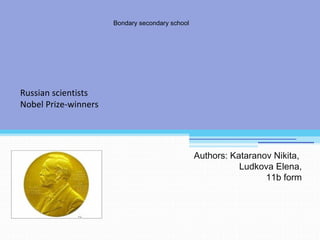Nobel prize
- 1. Russian scientists Nobel Prize-winners Bondary secondary school Authors: Kataranov Nikita, Ludkova Elena, 11b form
- 2. Tasks: 1. Find out some information about scientists. 2. Know about their input into world science. 2 Aim: tell about Russian scientists Nobel Prize-winners.
- 3. Ivan Petrovich Pavlov (1849-1936) Ivan Petrovich Pavlov was born on September 14, 1849 in the village of Ryazan. He went to the Church school, and was later was enrolled in a theological seminary. It was after reading The Origin of the Species by Charles Darwin, and the works of Russian physiologist I. M. Sechenov that Pavlov decided to abandon his theological studies and become a man of science.Pavlov was Director of the Physiological Laboratory at the clinic of S. P. Botkin, a famous Russian physician. It was there he produced his doctoral thesis on The Centrifugal Nerves of the Heart, for which he was later awardedthe Nobel Prize in Medicine/ physiology (1904).
- 4. Ilya Ilyich Mechnikov Ilya Ilyich Mechnikov was born in a village near Kharkov in the Russian Empire (now Kharkiv, Ukraine). Mechnikov was a Russian microbiologist best remembered for his pioneering research into the immune system. Mechnikov received the Nobel Prize in Medicine in 1908, for his work on phagocytosis. (1845 â1916)
- 5. Nikolay Nikolayevich Semyonov (1896 â1986) Nikolay Semyonov is a Russian physicist and chemist. He was awarded with Nobel Prize in 1956 in Chemistry for his work on the mechanism of chemical transformation. Semyonov's outstanding work on the mechanism of chemical transformation includes an exhaustive analysis of the application of the chain theory to varied reactions (1934â 1954) and, more significantly, to combustion processes. He proposed a theory of degenerate branching, which led to a better understanding of the phenomena associated with the induction periods of oxidation processes.
- 6. Lev Davidovich Landau (1908 â1968) Lev Davidovich Landau was a prominent Soviet physicist who made fundamental contributions to many areas of theoretical physics. His accomplishments include the independent co-discovery of the density matrix method in quantum mechanics, the quantum mechanical theory of diamagnetism, the theory of superfluidity, the GinzburgâLandau theory of superconductivity, the theory of Fermi liquid, the Landau pole in quantum electrodynamics, and the two-component theory of neutrinos. He received Nobel Prize in Physics in1962 for his development of a mathematical theory of superfluidity that accounts for the properties of liquid helium II at a temperature below 2.17 K (â270.98 °C).
- 7. Nikolay Gennadiyevich Basov (1922 -2001) Nikolay Basov was a Soviet physicist and educator. For his fundamental work in the field of quantum electronics that led to the development of laser and maser, Basov shared Nobel Prize in Physics in 1964 with Alexander Prokhorov and Charles Hard Townes.
- 8. Pyotr Leonidovich Kapitsa (1894- 1984) Pyotr Kapitsa was born in Kronstadt, Russia. From 1923 to 1926, Kaptisa became a Clerk Maxwell Student at Cambridge University, and then Assistant Director of Magnetic Research at Cavendish Laboratory (1924-1932). He worked in Cambridge for more than 10 years. He discovered superfluidity with some contribution from John F. Allen and Don Misener in 1937. Kapitsa won the Nobel Prize in Physics in 1978 for his work in low-temperature physics.
- 9. Zhores Ivanovich Alferov (born March 15, 1930) Zhores Alferov is a Soviet and Russian physicist and academic who contributed significantly to the creation of modern heterostructure physics and electronics. He is an inventor of the heterotransistor and the winner of 2000 Nobel Prize in Physics.
- 10. Informational resources ÐÐĩŅÐūÐīÐļŅÐĩŅКаŅ ОÐūзаÐļКа К ÐķŅŅÐ―Ð°ÐŧŅ ÐÐŊÐĻ, â3/2004 http://www.postsovet.ru/uploads/images/8/3/d/d/9/f6ad5b5eed.jpg http://www.t-l.ru/p/53915.jpg http://russiapedia.rt.com/files/prominent-russians/science-and-technology/pyotr-kapitsa/pyotr-kapitsa_3-t.jpg http://rus-eng.org/upload_img/e8cb464d7c0f01da03958b6cfccc61cf_big.jpg http://www.statemaster.com/wikimir/images/upload.wikimedia.org/wikipedia/en/thumb/5/52/Lev_Davidovich_Landa u.jpg/150px-Lev_Davidovich_Landau.jpg http://learning.multiring.ru/course/chemistry/content/scientist/section/paragraph95/images/semenov.jpg http://www.odessitka.net/images/stories/znamenitye/gamelya2_1.jpg http://www.medline.ru/public/histm/medbuildings/img/iemhis-f1.jpg









